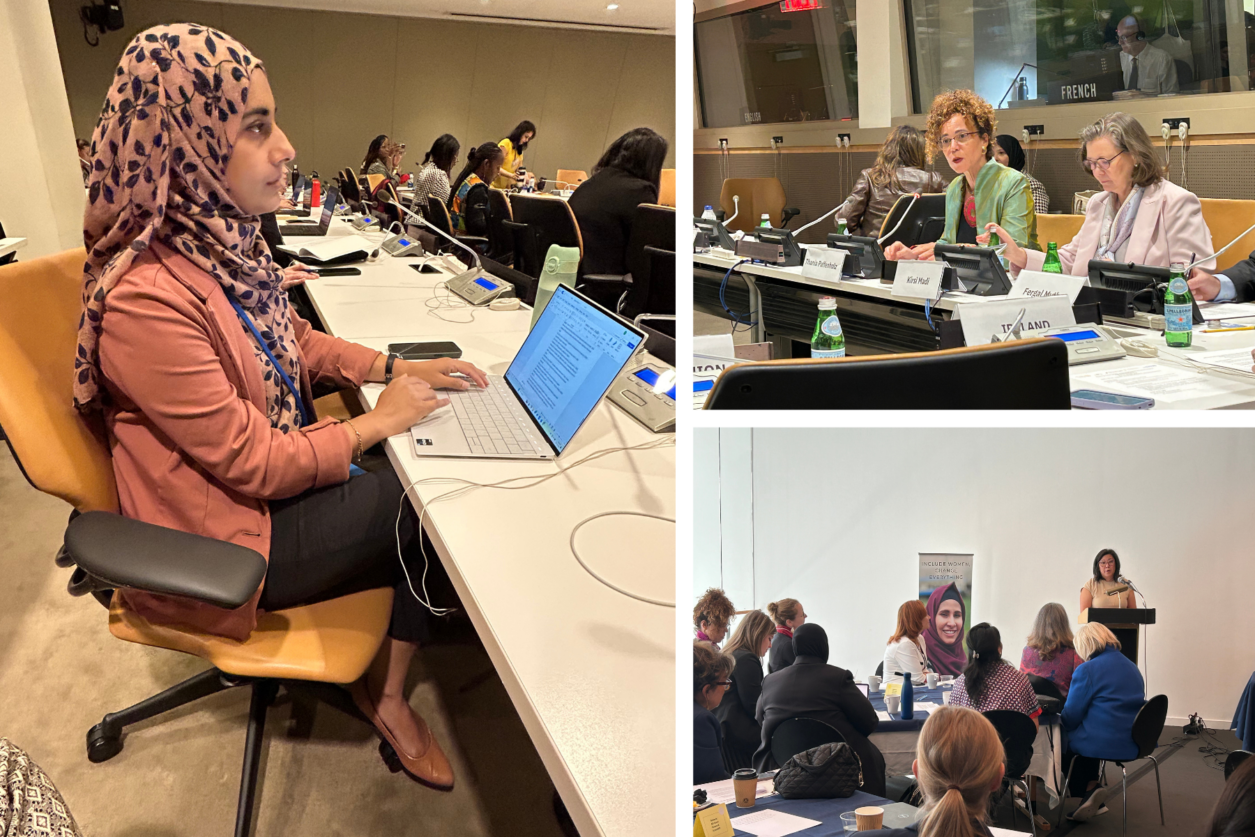 Top left: WRC’s Sadia Kidwai attends an event at the UN during Women, Peace and Security week. Top right: Thania Paffenholz, director and founder of Inclusive Peace speaks. Bottom right: US Rep. Grace Meng (NY-06) talks during a WPS event.
Top left: WRC’s Sadia Kidwai attends an event at the UN during Women, Peace and Security week. Top right: Thania Paffenholz, director and founder of Inclusive Peace speaks. Bottom right: US Rep. Grace Meng (NY-06) talks during a WPS event.
At the end of October, governments, civil society activists, and humanitarians from around the world gathered in New York for the UN’s Women, Peace and Security (WPS) week. This annual convening tracks global progress on UN Security Council Resolution 1325 on WPS (UNSCR 1325), which commits to addressing the specific needs of women and girls in conflict, and their inclusion in conflict prevention and peacebuilding. The week, which is dominated by dozens of government and civil society events, culminates in the UN Security Council’s annual Open Debate on WPS.
During the week we also launched our latest report, In Her Own Words: Voices of Sudan, in partnership with the Sudan Family Planning Association and Gender in Emergencies Group. The report shares the stories of more than 20 women who have been subjected to violence and repeatedly displaced during Sudan’s brutal civil war, unprotected and sidelined from decision-making, despite global commitments to WPS.
Next year will mark the 25th anniversary of the UN’s WPS agenda. Yet more than two decades on, the tone of the conversations in New York last month was far from celebratory. The Secretary-General’s annual report on WPS painted a stark and painful picture, noting that “amid record levels of armed conflict and violence, progress made over decades is vanishing before our eyes.” Women and girls face disproportionate and escalating violence. In 2023, the proportion of women killed in armed conflicts doubled from 2022; the number of UN-verified conflict-related sexual violence (CRSV) cases increased by 50 percent; and the number of girls affected by grave violations in armed conflict increased by 35 percent. Yet funding for women’s civil society organizations is at a three-year low, and in 2023, women made up less than 10 percent of negotiators in peace processes worldwide.
Beyond the bleak statistics, the week was bursting with personal testimonials and harrowing stories from women currently living through conflict. Women from Afghanistan, Myanmar, Palestine, Sudan, Syria, Ukraine, Yemen, and more travelled to New York to share their experiences participating in peace negotiations and political activism in their own countries. Dr. Habiba Sarabi, Afghanistan’s former minister of women’s affairs and participant in the Doha peace talks with the Taliban, spoke of how women on the negotiating team have had to fight a battle on two fronts: for representation among their male colleagues, as well as for their human rights under the Taliban. Hala Al-Karib, an activist and researcher from Sudan, noted the consequences of ignoring women’s voices in governance—Sudanese women had already rung the alarm bell years ago on Janjaweed militants facing no accountability for their crimes while being rewarded with positions in governance—resulting in the war crimes witnessed in Darfur now being inflicted across the country. Kateryna Levchenko, Ukraine’s government commissioner for gender equality, pointed out that Ukrainian women were unable to think of mediation now, as they had to prioritize “survival and victory.” Dr. Tahreer Araj, a Palestinian academic and civil society leader, spoke bluntly of the failure of Western feminist institutions and the limitations of UNSCR 1325 to protect Palestinian women and girls from the gendered violence of Israel’s occupation.
“Participation” was the dominant theme of this year’s convening. We heard repeatedly how, despite leading civil society activism and participating in informal peace negotiations, women and women-led organizations continue to be sidelined from formal (or Track 1) peace negotiations. Numerous events interrogated how to bridge the gaps between formal and informal peace negotiations, as well as enable internal mediation between different groups—recognizing that women are politically diverse and cannot be expected to negotiate as a homogenous group. Many criticized the tokenistic participation of women in some processes, or the relegation of women participants to simply “advisors” or only to be consulted on “women’s issues.” Some argued that traditional Track 1 approaches—which focus on negotiations between leaders of warring parties—were at fault, in that they excluded not just women, but multiple civil society groups, including minorities, youth, and academia.
There were discussions on the importance of supporting women to enable their participation in peace processes—from the political (such as employing male champions to advocate for their inclusion, strengthening the capacity of women participants, and putting in place measures to protect women activists from reprisals) to the practical (enabling access to visas, securing childcare, and ensuring mental health support). Yet notably, little attention was given to the specific impacts of displacement on the protection and participation of women during conflict.
In our own research at the Women’s Refugee Commission, we know that displaced women face unique vulnerabilities and challenges during conflict, including loss of shelter, social protection mechanisms, and income, as well as unreliable access to essential services, insecure asylum or immigration status, xenophobia, and major disruptions to social support and civil society networks—all of which increase women’s vulnerabilities to violence and exploitation.
With the global spread of authoritarianism, and escalating conflicts in Sudan, the Middle East, and Ukraine, we are entering unprecedented levels of vulnerability and violence for displaced women and girls around the world. Now more than ever, it is essential that governments and civil society groups urgently prioritize implementation of the WPS agenda, to ensure women and girls’ protection from violence and participation in securing their own futures.

